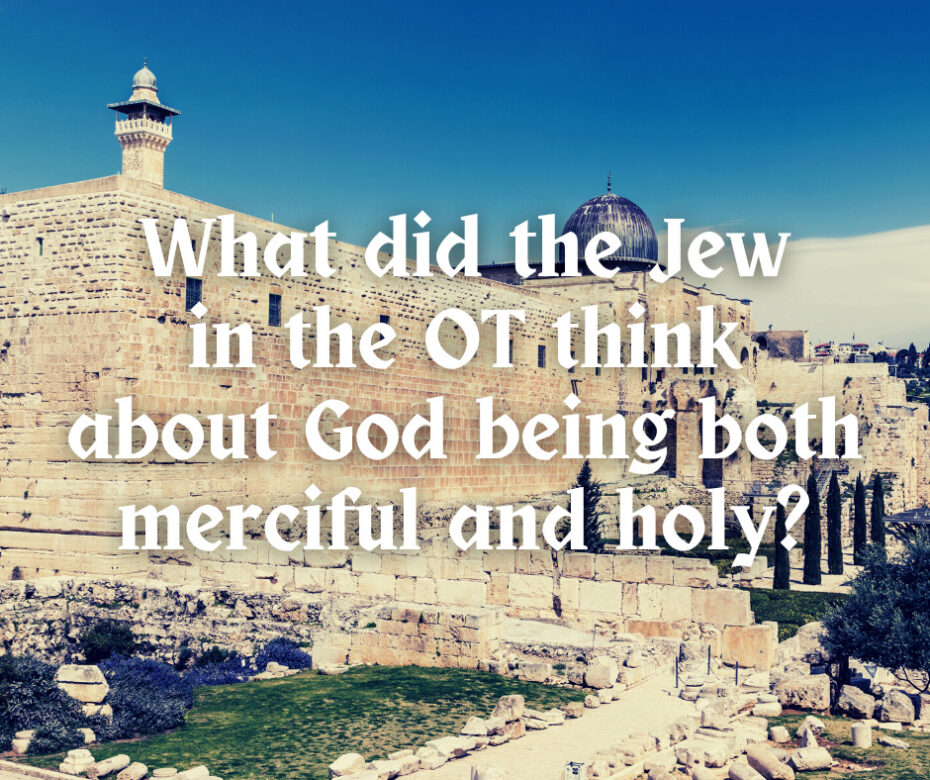We don’t know who wrote Psalm 99. However, we do know what he thought about God: He is a strong and great God (vv 2, 4); He reigns over His people (v 1); all the world should tremble before Him (v1).
But it is probably another of God’s characteristics that the psalmist wants most to emphasize. Three times in this short psalm he says that God is holy (vv 3, 5, 9). In fact, holy is the psalm’s last word (v 9). Not surprisingly, then, the author also speaks of God’s righteousness (v 4), and of the Law He gave Israel (v 7). That Law reflected His holiness.
So, the Lord who dwells in the temple in Jerusalem is an all-powerful and holy God. Who could hope to endure such a presence?
To answer that question, more must be known about the Lord. The psalmist points out that God is also merciful. In the psalm he speaks of Moses, Aaron, and Samuel. These were men who called upon the Lord on behalf of the people after the people had sinned (Exod 14:15; 17:11–12; 32:11–13, 30–32; Num 12:13; 14:13–19; 16:22; 21:7; 1 Sa 7:5, 8–9; 12:16–18). And what did God do? He answered them and was to them the “God-Who-Forgives” (v 8). The perfectly holy God–who is able to move the earth and who dwells between the cherubim over the mercy seat in the temple (v 1)–is a forgiving God.
One can only wonder what the faithful Jew thought about this seeming contradiction as he stood outside the temple in Jerusalem and worshiped the Lord who dwelt behind the curtains. How could He be both holy and so merciful? The Lord had repeatedly forgiven His chosen people throughout Israel’s history.
The astute worshiper would, perhaps, think about what the Lord had said to Moses many years earlier. He told the leader of His people that He is a God who, while “forgiving iniquity and transgression and sin,” would by no means clear the guilty (Exod 34:7). As the psalmist said, the Lord is both gracious and unbendingly holy. It seemed contradictory. The observant Jew simply knew it was true.
We NT believers have much more light on this perplexing apparent contradiction. The psalmist spoke of God who “dwells between the cherubim” over the mercy seat. It was there that the blood of an animal was placed every year for the sins of the people. Paul tells us that Christ has become our mercy seat (Rom 3:25). His blood was the sacrifice that took away the sins of all of us (John 1:29). The blood of all those animals pointed to Him.
Then, in the very next verse, Paul answers the question the faithful OT Jew might have had. Because Jesus’ death paid the price for all our sins, the holy God can be just when He declares the believer righteous (Rom 3:26). The Lord remains holy even when He is merciful towards us. Christ’s death is the reason He can give eternal life—the greatest illustration of His mercy towards us—to anybody who believes in Him alone for it.
One of my main struggles in studying the psalms is determining when the writer is speaking only of Israel and when he is pointing to a future day. The psalms often speak of the time when Christ returns and sets up His kingdom. In Psalm 99 the psalmist starts off with the words, “The Lord reigns!” Is he talking about the fact that God rules over His people in Jerusalem? Is he simply saying that He alone is God and that all the idols of the nations are imposters? This would mean that the author is calling the nation of Israel to worship Him in His temple.
Most, however, recognize that the psalmist is also looking forward to an even greater display of God’s power. Christ will return. When He does, He will reign over the whole earth. The writer exhorts “all the peoples” to praise His name (vv 2-3).
We know that day is coming. In the last verse, the author tells his readers to “exalt the Lord.” Yes, the Jews of his day are called to do it. But he also envisions a day when all the nations will worship the Lord. He will bring in a righteous kingdom because He is holy.
But He is also merciful. Because He is, everyone who has ever believed in Him for the gift of life will be a part of His kingdom forever. We can join with the psalmist and praise the Lord because He is both holy and merciful.


